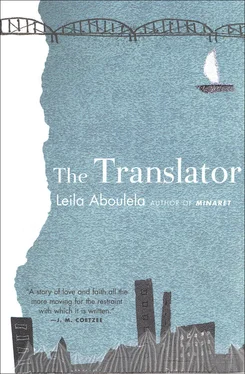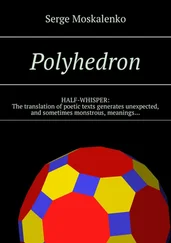‘Loneliness is Europe’s malaria,’ Rae said. ‘No one can really be immune. This is not so hygienic a place, don’t be taken in by the idols it makes of itself. You might even come to feel sorry for it, just a little, not too much, for there is no injustice in this decay. I am anxious,’ he said, ‘that when you go back home you will realise that I am much cruder than you, that I am not as you think me to be.’
My last Friday.
He showed her the card that his daughter sent him when he was in hospital. ‘Get Well Soon, Dad’, the card said and it had a picture of a bandaged bear. Sammar found the wording strange without ‘I wish’ or ‘I pray’, it was an order, and she wondered if the child was taught to believe that her father’s health was in his hands, under his command. But she did not share her thoughts and instead admired the school photograph that Mhairi had sent with the card. Her uniform was a tartan kilt, a matching jumper and tie. She stood out from among the rest of her class because she was his daughter and looked a little like him.
‘Whom does she resemble more, you or her mother?’ Sammar asked. But he was not keen to follow this line of conversation.
Of the reasons for the break-up of his marriage, she could only guess. If she asked him directly, she knew she would not be fulfilled with the concise, measured answer he would give. So on her own she looked inside, lifted up the veils that blocked her vision. One veil: he could not make anyone unhappy: another veil: to leave him that woman must have a low IQ. Finally in the deep she caught sight of the truth: his stubbornness and a wife with a successful career who earned more money as a bureaucrat with the UN than he did as a professor in a provincial university. A woman who grew tired of travelling back and forth from Geneva to Edinburgh to see her daughter in boarding school, then to see him in Aberdeen. He would not go with her to Geneva. Geneva, he said, was too neat and for him there were only three places in the world: Scotland, North Africa, the Middle East. That woman, after a snide remark too many, The UN is a sham and everyone knows it, after a quarrel too many, I spent five miserable years with you in stinking Cairo, sat down alone one day with a coffee and a cigarette, and asked herself, ‘What exactly do I need him for?’
My last Saturday. My last Sunday…
He phoned her but they could not speak for long. On the landing people came and went, banged the door. A girl with long greasy hairy stood behind Sammar and wanted to use the payphone too. Sammar wished she did not live in a place like that, she wished that she could be settled with a telephone in a kitchen that was her own. She could talk and at the same time wipe the crumbs off the table, turn the cooker off.
‘I must go,’ she whispered, but he would not let her go, he went on talking and she did not want to miss a single word. ‘I have to go.’ Behind her the girl with long hair, huffed and blew with impatience, ‘Are you going to be all day? Are you going to be all day?’ The girl had no mercy.
It was not the same as when she and Rae had talked a month ago, during the Christmas holidays, when Sammar had the building all to herself. Even at night, they could not talk. The stairs at night-time were dangerous highways, now and again the sounds of thumps and heaving, shouts, snatches of songs. Someone vomited on the bottom stairs, curry and beer, on the same place where Sammar had put her cushion and sat speaking to Rae.
My last Monday.
What she heard from everyone except him: Lucky you, to get away from all this dreadful weather we’ve been having lately. You must be so happy you are going to see your son again. How many years since you’ve been backs’ Four years? That is a long time.
My last Tuesday.
At that early time of the morning, the Senior Common Room was quiet. Apart from Sammar and Rae, there were two men and a lady with curly blonde hair who had slid their mugs of coffee down the metal rail to the cashier and sat under the No Smoking sign. In this room Sammar liked the tall windows that looked out over the other university buildings, the way the grass curved upwards to the road, the white dome of Engineering shaped like a mosque. Would she remember these things? The way Rae tore open a packet of sugar, would she remember that in a place where there were no packets of sugar? Or his jacket, would she remember its colour in a place where people had no need of wool or jackets? The future whined for her attention. Picture the interviews in Egypt, young men smoking one cigarette after the other. Picture sun and dusty roads, shops not so well stocked, shabby cars and shabby clothes, undecorated rooms. Picture them all, soon they will be…
‘You are already away from me,’ he said as if he could hear the future whining, as if he could see the future pulling at her hand. He watched her, he looked at her more than she looked at him. Cups of tea held her attention, smooth flawless plastic spoons.
‘No. No, I’m still here.’
They were together at this uncomfortable time of the day to wring whatever time they could, what was left. In an hour they would be engulfed by work and the voices of people, they would be part of a bigger churning whole, projects for her to hurry up and finish before she left, classes for him and the visit of Dr Fareed Khalifa from Stirling. They were writing a paper together which meant hours of discussion.
She said, ‘Yesterday when I spoke in Arabic to Fareed, I felt that home was close.’ Yesterday, she had met him in Rae’s office. He was short and energetic-looking with a beard and the habit of asking one question after the other. But she had not minded answering his questions, the curriculum vitae of her life. He had in turn told her about his wife who was a student, his three children who were in school. She had enjoyed talking in Arabic, words like insha’ Allah, fitting naturally in everything that was said, part of the sentences, the vision. How many times had she over the past days said in English ‘I’m leaving on Friday’, and the sentence normal and natural as it was to the people who heard it, had sounded in her ears incomplete, untruthful without insha’ Allah.
‘You were patient with all his questions,’ Rae said. ‘Most people aren’t.’
‘You’re not?’
‘No.’
‘Because you are secretive.’
He laughed and said, ‘What makes you say that?’
She said, ‘Something you said once. You and Yasmin were talking about how schoolgirls in France were not allowed to wear hijab. Do you remember? Yasmin was angry…’
‘Yes, I remember.’
She remembered the November afternoon and feeling glad that Yasmin, who was giving her a lift home, was talking to Rae, not in any hurry to leave. Not in a hurry to go home because Nazim was off-shore and it had struck Sammar then that the three of them had no one expecting them at home, only voices that came out of radios and television sets.
She talked about that day, finding a new past that was not shrouded in sleep. A recent past that could be pulled out, silk from a drawer, to admire and touch. ‘You said you liked hijab and I asked you why. It was the only thing I said the whole time…’
‘Yasmin doesn’t give you much chance to speak, does she?’
She frowned, ‘That’s not fair, she does… Anyway, I asked you why you liked it and you said because it is secretive. That is what you said.’
‘And that made you think that I am secretive?’
‘Yes…’
‘I was complimenting you,’ he said. ‘Didn’t you realise?’
She shook her head and looked out of the window at the winter sun on the dome of the Engineering building. The noise of the room, cutlery being moved, set out, the ventilator fan from the kitchen. If things were different, she would have smiled and asked, ‘Complimented me on what?’ and enjoyed the things he would have said. But she was afraid of confessions, emotional words. Uneasy. Meeting him, talking to him had become a need she was not comfortable with. Yesterday she had wondered if Fareed had sensed, had guessed from the way Rae looked at her, from the way she spoke. She envied Fareed because he was married and she was not, and marriage was half of their faith.
Читать дальше












